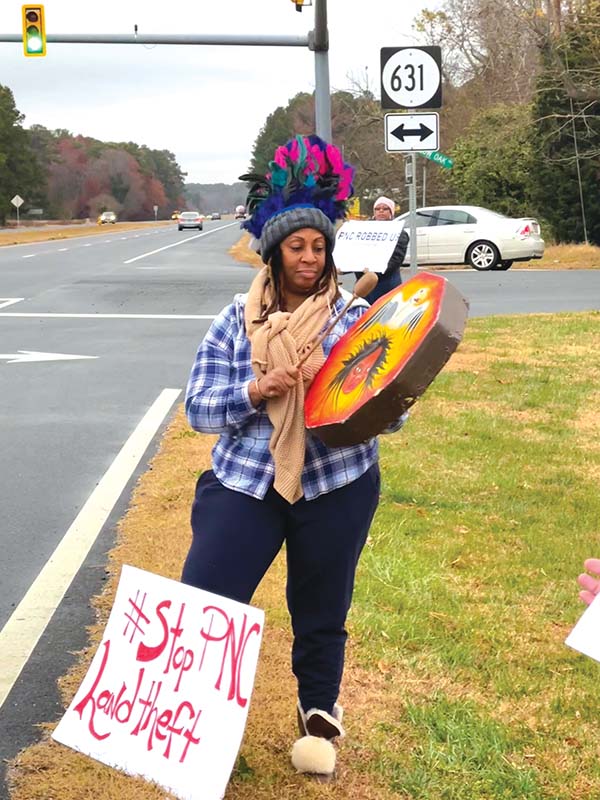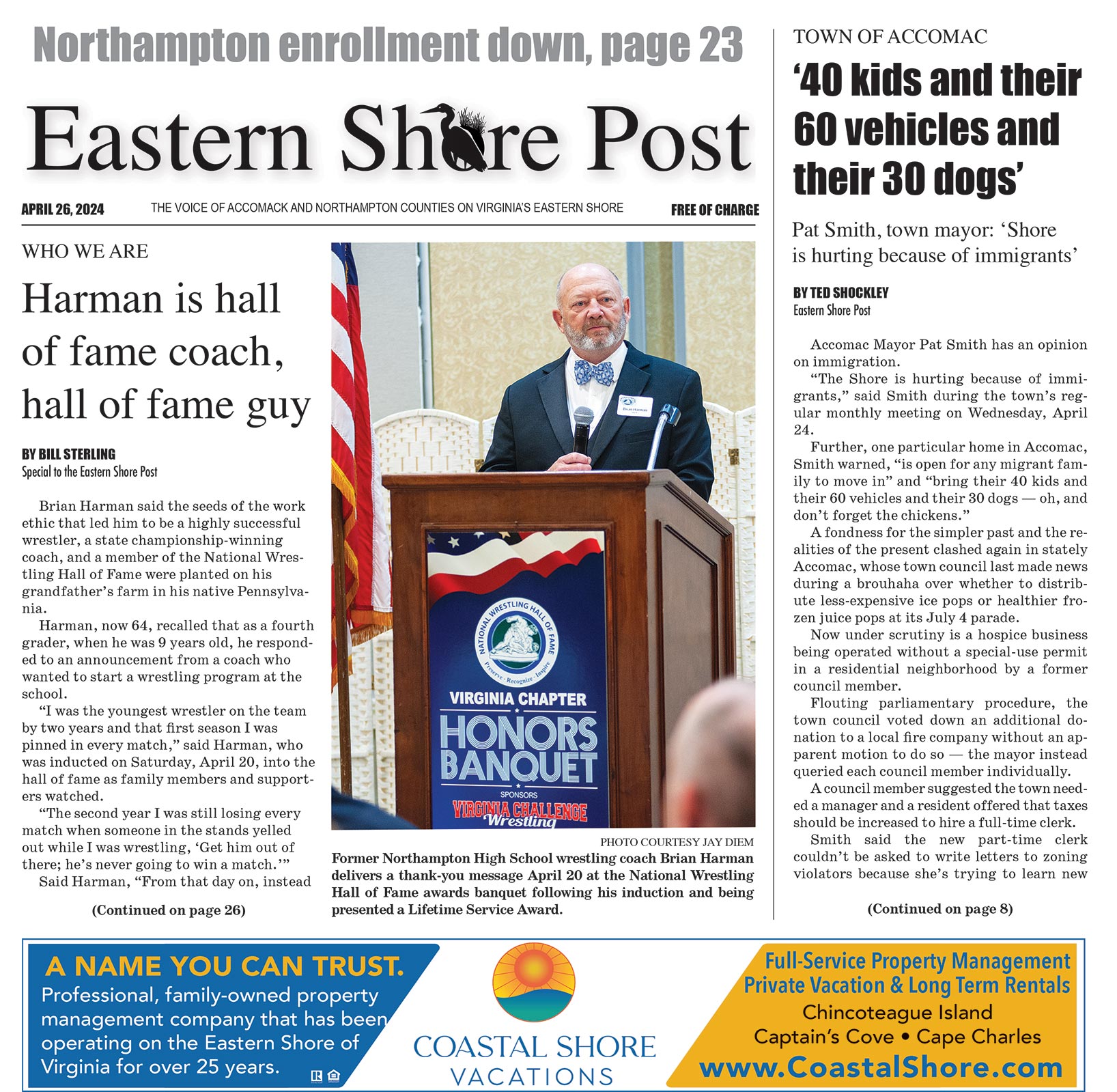
By Stefanie Jackson – Lisa Cypress, the Accawmacke Indian descendant who is suing the Northampton County Board of Supervisors and PNC Bank for the return of native lands in their possession, including Eastville’s Indiantown Park, has filed a new amendment to her complaint, providing newly discovered evidence supporting her claim to the land and suggesting that past transfers of the land’s ownership may have involved fraud.
The Accawmacke Indians, aka the Gingaskins, lived on a reservation that was established in 1640 in the area known today as Eastville. Through an 1815 settlement agreement, the reservation was divided into 27 lots, each 25.5 acres, which were deeded to remaining members of the Accawmacke Indian tribe.
Over the last two centuries, ownership of much of the land was transferred to people who were not of Accawmacke Indian descent, and sometimes the deeds were fraudulent, Cypress contends.
Because she resides in Georgia, but the Accawmacke Indian land is in Virginia, Cypress filed her lawsuit in federal court – the U.S. District Court, Eastern District of Virginia.
Previously, PNC Bank rejected Cypress’ claim to the land occupied by its Eastville branch because the 15-year statute of limitations had passed to dispute the ownership of the property.
However, Cypress pointed out in her Dec. 17 amended complaint that “a fraudulent conveyance has no specific statute of limitations” and referred to Virginia Code 55.1-400, which states that fraudulent property conveyances are void.
Her recent amended complaint includes additional information on her blood relation to the Accawmacke Indian landholders, corrects errors in her original complaint, and identifies potential evidence of fraud in deeds that transferred land ownership to people outside the Accawmacke Indian bloodline.
Cypress is suing for four lots that were deeded to her ancestors through the 1815 settlement agreement: Ebby Francis’ Lot 26, which is half of Indiantown Park; Thomas Baker’s Lot 27 and part of Betsey Baker’s Lot 1, which combined form the other half of Indiantown Park; and Ann Drighouse’s Lot 16, on which the Eastville branch of PNC Bank is located.
Her original complaint included only one of the Accawmacke Indian lots that make up Indiantown Park; the third amended complaint includes all three lots.
Cypress’ original complaint also connected the PNC Bank property to Molly West; however, the third amended complaint notes that a certified surveyor – from the land and environmental consulting firm CABCO, based in Massachusetts – concluded the bank is on the property that belonged to Ann Drighouse.
Cypress provided a genealogical breakdown generated on the Ancestry website, which connects her to Ebby Francis, born Edith Bayly or Bailey in 1792, who was granted Lot 26, which became half of Indiantown Park. She was Cypress’ fourth great-grandmother.
- Ebby Francis married William House II, and their son, George House, became the third great-grandfather of Lisa Cypress.
- George House married Martha Baker, and their son, George House II, became the great-great-grandfather of Lisa Cypress.
- George House II married Mary Sample, and their son, Samuel House, became the great-grandfather of Lisa Cypress.
- Samuel House married Annie Paramour, and their son, Roger House, became the grandfather of Lisa Cypress.
- Roger House married Virginia Mae Bagwell Joynes, and their daughter, Virginia Mae House, married Henry Cypress Jr. and became the mother of Lisa Cypress.
Cypress also provided the genealogy connecting her to Thomas Baker II, born 1768, who owned Lot 27, and Betsey Baker, born Betsey Bingham around 1745, who owned Lot 1 and was Cypress’ sixth great-grandmother. Their properties constitute the other half of Indiantown Park.
- Betsey Bingham married Thomas Baker, and their son, Thomas Baker II, became the fifth great-grandfather of Lisa Cypress.
- Thomas Baker II married Mary Beavans, and their daughter, Mary Baker, became the fourth great-grandmother of Lisa Cypress.
- Mary Baker married Edmund Bagwell, and their son, Isaac Bagwell, became the third great-grandfather of Lisa Cypress.
- Isaac Bagwell (born 1810) married Grace Baldwin, and their son, also named Isaac Bagwell (born 1840), became the great-great-grandfather of Lisa Cypress.
- Isaac Bagwell married Fannie Mae Upshur Francis, and their daughter, Simmie Bagwell, became the great-grandmother of Lisa Cypress.
- Simmie Bagwell married Thomas Joynes, and their daughter, Virginia Mae Bagwell Joynes, became the grandmother of Lisa Cypress.
- Virginia Mae Bagwell Joynes married Roger House, and their daughter, Virginia Mae House, married Henry Cypress Jr. and became the mother of Lisa Cypress.
These genealogical breakdowns show that Lisa Cypress is blood-related to the Accawmacke Indians through both of her maternal grandparents.
Cypress’ family ties to the PNC Bank property are a bit more complex; she is the first cousin five times removed of Ann Drighouse, who was granted Lot 16, the current location of the Eastville bank, according to a professional survey.
A name that appears in the genealogical breakdowns for both Ann Drighouse and Ebby Francis makes the relationship between Drighouse and Cypress easier to understand: William House II.
William House II married Ebby Francis, and they became Cypress’ fourth great-grandfather and fourth great-grandmother, respectively.
William House II was the brother of Necie House, who was the mother of Ann Drighouse, meaning Necie House was Cypress’ fourth great aunt and Ann Drighouse was Cypress’ first cousin five times removed. (The number of times two relatives are removed equals the number of generations between the two relatives.)
Included in Cypress’ third amended complaint, filed Dec. 17, 2021, is a signed and notarized affidavit in which she declares the provided genealogies to be true and accurate to the best of her knowledge.
Cypress’ complaint also provided evidence that suggests the Indiantown Park and Eastville bank properties were taken from the Accawmacke Indians through fraudulent means.
The Accawmacke Indian land that belonged to Ann Drighouse was sold by Anne Pool to George Outten in 1831, according to Northampton County Circuit Court records, deed book 29, page 222.
The record claims that Anne Pool was formerly Ann Drighouse. However, genealogical records show that Anne Pool, who was born in the 1800s and married Charles Pool in 1820, was formerly Anne Driggus, not Ann Drighouse.
Ann Drighouse was born Ann Bingham in about 1788 to C.F. Bingham and Necie House Bingham. Her name changed when she married William Drighouse in 1802.
Genealogical records demonstrate that Anne Pool – the grantor on the deed to the land sold to George Outten in 1831 – is not the same person as Ann Drighouse.
Furthermore, handwriting expert Travis King, whose business is based in Oregon, examined the deed and concluded it is written in handwriting that matches George Outten’s signature on the deed. Anne Pool’s signature was merely an X and could not be analyzed.
Based on genealogical records and the handwriting expert’s opinion, Cypress maintains that the deed is fraudulent.
Sometime after the Outtens acquired the land, it became the property of Kendall Addison Jarvis. Cypress is not certain how the property switched hands, but she noted that George Outten’s wife, Ann Outten, had a grandmother named Mary Jarvis, so there may have been a family connection.
After Kendall Addison Jarvis died, much of his property was sold at auction, and the land in question was purchased by Robert Scott and his wife, Ann Kellam Scott.
Northampton County land records show that PNC Bank, then called the Eastville Bank, purchased the land from the Scott family in 1971.
Cypress also alleges fraud in the process by which Northampton County came to possess the Ebby Francis lot, which is half of Indiantown Park.
Ebby Francis was born Edith Bayly or Bailey in 1792. The nickname Ebby was sometimes written as Ibby, and other variations of the name were used. She was married several times; in addition to John Francis, she was married to Nelson Baker and William House II, Cypress’ fourth great-grandfather.
Cypress pointed out issues with the deed that transferred ownership of the Ebby Francis lot: The deed stated that Francis died in 1838, but genealogical records show she did not die until 1878.
Furthermore, the property was given to Francis’ son-in-law, George Stephens, even though her son, Thomas Shadrach Baker – who was born in 1828 and died in 1900 – still lived in Northampton County.
(Thomas Shadrach Baker was the father of the Rev. Thomas Nelson Baker, born in Eastville in 1860 and known as the first African American to receive a doctorate in philosophy.)
The Ebby Francis lot continued to change hands. The land was purchased by Cecil, Raymond, Lynwood, Thomas, and Leonard Moore Jr. in 1957. It was acquired by the United States of America through eminent domain in 1960 and used as a NASA camera site. Finally, when the United States no longer had any use for the land, it was deemed surplus and granted to the Northampton board of supervisors for the county’s use as a public park – Indiantown Park.
But Cypress maintains that she, a descendant of the Accawmacke Indians, is a true owner of Indiantown Park because it was given by the federal government to the Accawmacke Indians through a land patent.
A Virginia Department of Historic Resources historical marker located in Eastville explains: “The Gingaskin Indian Reservation was located nearby from 1640 to 1813 and was created from a land patent in 1640 that set aside land for the Accomac Indians. When the Accomacs moved there, they became known as the Gingaskins. They continued to practice their traditional economy of farming, hunting, and fishing. By the 1760s, portions of the reservation had been leased to outside groups to help support the Gingaskins, who were suffering from a decreased population and pressures from their white neighbors. The legal termination of the tribe began in 1813, essentially against the Gingaskins’ will, when their land was divided into plots and deeded to surviving members.”
Historically, a U.S. land patent granted permanent ownership to individuals and heirs of land that originally was acquired by the federal government through treaties.
In her amended complaint, Cypress wrote, “The Land Patent is the only form of proof of absolute title to land in the United States of America.” She also cited the U.S. Supreme Court case, United States v. Stone, which states, “A patent is the highest evidence of title and is conclusive as against the government and all claiming under junior patents or titles.”
Furthermore, Cypress contends that Northampton has violated a condition of the deed from the United States of America, which states the county “shall protect and maintain the Indian burial grounds located on the property herein conveyed.”
Her third amended complaint included a copy of a map showing cemeteries in Indiantown Park and a written account of observations she made while visiting the park.
“The SACRED Indian Burial Grounds is in an overgrown disaster,” Cypress wrote. The graves, including one belonging to an Indian chief, are covered by weeds and bushes. Moreover, a disc golf course and fitness obstacle course are on the burial grounds, she contended.
PNC Bank filed a response Dec. 29 and asked the court to rule on PNC’s pending motion to dismiss the case. PNC maintained its previous position that Cypress has not proven that she is the owner of the property in question or that her ancestor’s property is the same property occupied by the bank. PNC also maintains its position that the statute of limitations to dispute the property ownership applies and has passed.
Northampton County has not yet filed a response to the third amended complaint; it also previously moved for the case to be dismissed.
Northampton County Commonwealth’s Attorney Beverly Leatherbury said, “I don’t feel that a response is immediately due until the court rules on previous motions that are before it.”
She also responded to the allegations that Indian graves are being desecrated and said there is “no intentional desecration” but those are “serious allegations that need to be looked into.”


